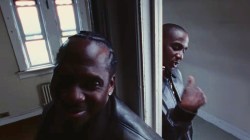A great and meaningful work of art must stand on its own without the
need for a back story; its intentions clear to all regardless of what
they bring to it. Unfortunately, DJ Spooky has not created such
a work and is instead guilty of all the transgressions. He has made an overly long record of mid-tempo loops, polite
Jazz, and languid “re-imaginings” of other artists’ songs. Spooky claims it all has something to do with the current economic crisis, but aside from a lazy George Bush
sample and a track which features lyrics addressing the crisis in
Chinese, there is little that would let on that the record has anything
to do with the recession. But an even worse offense than
pretentiousness is committed by Spooky on The Secret Song: the album is dull, and for a Hip Hop album, even an “alternative” one, that is unforgivable.
Breaking the record down track by track is of little service as the
album seems to be intended as one long, 80 minute suite with many
musical themes repeating themselves. But a few tracks require singling
out. First there is the trio of Dub tracks. But these dubs are no more
than loops of great riffs created by others (two by Led Zeppelin, one by Radiohead)
which were then laced with strings and allowed to repeat for several
minutes. What that has to do with the economy is anyone’s guess. Next
there are the Jazz tracks, such as the flute driven “Heliocentric” and
the electric keyboard workout “Pax Per Fidem.” Both are pleasant enough
tracks, but they don’t do much and after a few minutes the listener’s
thoughts will stray. Again, whatever connection Spooky is
trying to make between these songs and the economic collapse are
completely unclear. What fair better are tracks such as the woozy
“Iaco’s Lament,” the shuffling “Salt Satyagraha,” and best of all, the
driving “Point Counterpoint.” It is on these songs that the queasiness,
uncertainty, and anxiety of our current crisis are most apparent and
where Spooky shows his skill as a composer. It is perhaps
slightly ironic that the Jazz tracks work much better than the more
traditional Hip Hop tracks driven by loops and samples, such as
“Multiphonic,” an overly complicated song that nonetheless fails to
hold the listeners attention.
Of the two songs that adhere most closely to the album’s intended concept the first, “5 Million Ways to Kill a CEO,” featuring The Coup [click to read]
doing what they do best – threatening to take down capitalism one CEO
at a time, is by far the more memorable and enjoyable, the west coast
Rap crew injecting desperately needed energy. The second, the title
track, is a microcosm of what is wrong with the album as a whole. Over
a by the numbers Trip Hop backdrop, all loping beat and tinkling keys, a
disembodied voice delivers the aforementioned meaningful diatribe about
the state of the world’s economy in Chinese. One can assume that Spooky’s
intention here is to show how the recession is a worldwide problem and
how music can unite varied cultures. But why not present the lyrics in
English as well? By only presenting his “message” in a language that
most of his audience doesn’t speak he robs it of the power it could
have. This album makes it seem that Spooky approaches his music
almost completely cerebrally. A lot of people are quick to call Trap
rappers “ignorant” or “simplistic” but listen to an album like Young Jeezy’s The Recession [click to read] back-to-back with The Secret Song
and it is hard to imagine anyone would claim the former didn’t do a
better ( and infinitely more visceral) job of capturing these chaotic,
confusing times.










